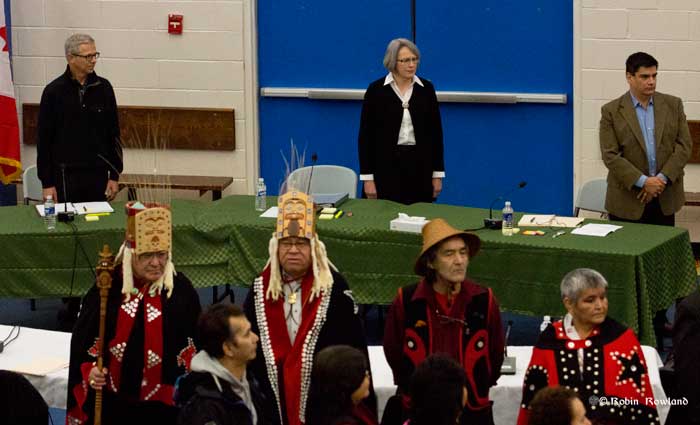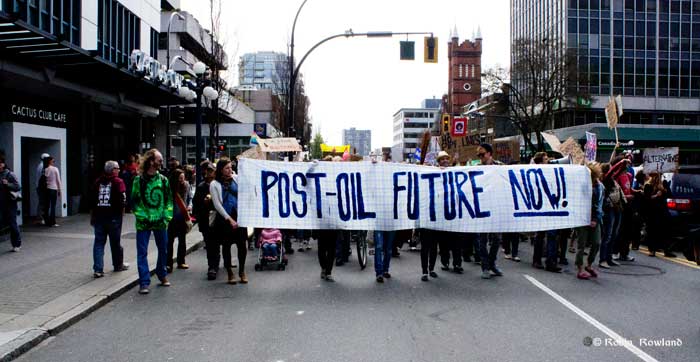The British Columbia New Democratic Party has written to the Northern Gateway Joint Review panel formally opposing the controversial pipeline project, while at the same time supporting the Kitimat LNG projects, as long as there are strong environmental controls on those projects.

A long letter from NDP leader Adrian Dix to the panel concludes by saying
as the Official Opposition, we have carefully weighed the risks and benefits of the NGP to British Columbia, and to Canada. After much consideration and consultation, we have come to the conclusion that the risks of this project far outweigh its benefits. We believe that the NGP will cause significant adverse economic and environmental effects and is not in the public interest. Therefore the NGP should not be permitted to proceed.
The letter also calls on the federal government to legislate a permanent ban on tankers for the west coast. The letter goes over the history of the Exxon Valdez spill
Eight of 11 cargo tanks were punctured, releasing about 258,000 barrels of crude oil, most of which was lost in the first eight hours. There were widespread ecological and economic impacts….To this day, vital shore habitats remain contaminated, the herring fishery has been closed for 15 seasons since the spill, and herring are not considered recovered. The clean-up costs alone are estimated at $3.7 billion…Wildlife and natural resource damages range from $8.5 billion to as high as $127 billion…. Related to the economic hardship felt by families and communities, a wave of social problems followed – alcoholism, high divorce rates and even suicides swept through the Sound’s small towns….
We simply cannot let this happen in British Columbia: the risk is just too great. Therefore, we are calling on the federal government to legislate a permanent moratorium on oil tankers and oil drilling activity on B.C.’s north coast to ensure the ecological integrity and economic and social vitality of the lands and waters of this unique region.
The letter also takes Premeir Christy Clark to task for not taking a stand on the Northern Gateway Issue
The Government of British Columbia agreed to the Joint Review Panel (JRP) process, limiting its ability to give voice to B.C.’s interests. In addition, the Province did not seek government participant status and has failed to exercise its intervenor status to fully represent the interests of British Columbians.
We note that other government agencies including an Alberta municipality, the Province of Alberta and Alberta’s Transportation Ministry, as well as the federal Department of Indian and Northern Affairs, Department of Justice, Environment Canada, Fisheries and Oceans Canada, Natural Resources Canada and Transport Canada have registered as government participants in the JRP.
We also note that the Union of British Columbia Municipalities, and a number of local
governments have passed motions opposing the NGP. These include: the Village of Queen Charlotte, Sandspit, Masset, Port Clements, Prince Rupert, Terrace and Smithers.As the Official Opposition, we take our responsibility to represent and to protect the interests of British Columbia and British Columbians seriously. We have listened to the concerns and diverse perspectives of constituents throughout the province and we have met with stakeholders and experts about the NGP.
The letter also expresses concern about the fairness of the Joint Review Process
Four New Democrat MLAs are actively participating in the JRP, as intervenors or as presenters. Three of these MLAs represent constituencies that will be directly impacted if the NGP proceeds. The fourth MLA is our environment critic. All of them, like the thousands of other British Columbians who are participating in the JRP, are doing so in good faith.
We are very troubled by statements of the Prime Minister and Minister of Natural Resources that have caused several commentators and JRP participants to question the objectivity of the process and ask if its outcome is predetermined.
Dix is quick to point out that the New Democrats are not against sustainable economic development.
The importance of sustainable economic development International trade and responsible resource extraction are essential to B.C. and Canada’s economy.
International trade creates good-paying jobs and vital communities. To this end, we are committed to building on our tradition of further developing trade relations with China and other Asia Pacific markets to build a strong B.C. economy.
Further, we have been clear about our support for the Kitimat liquefied natural gas project while emphasizing it comes with the serious responsibility to ensure strong environmental protections. We acknowledge that all resource development and extraction has inherent risks.
Other points in the NDP letter were:
- The tanker traffic to ship Alberta oil to Asian markets will require lifting of the current tanker moratorium and the Tanker Exclusion Zone, and will put the British Columbia coastline at serious risk of devastating environmental and economic damage from potential oil spills;The NGP will traverse remote and highly valued areas of B.C., and will cross almost 800 streams. The risk of spills from the proposed pipeline will put these valuable
environments and species, such as salmon, at risk;The impact of an oil leak or spill would be most severely felt by First Nation
communities. As has been affirmed by the Supreme Court of Canada, First Nations must be consulted effectively and be respected on a government-to-government level;• The greenhouse gas emissions generated by NGP-related oil sands development will
contribute to the economic, social, and environmental costs of climate change;
The NGP provides few long-term and sustainable economic benefits for British
Columbia, while shipping raw bitumen forgoes important value-added economic
development opportunities involving upgrading and refining the oil in Canada;• The NGP is forecast to increase Canadian oil prices for Canadian consumers.





